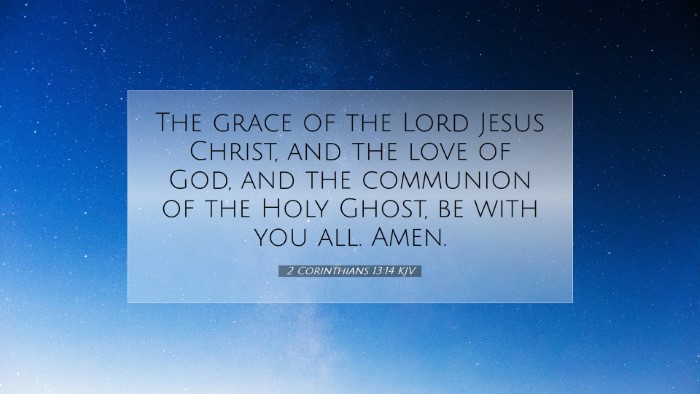Old Testament
Genesis Exodus Leviticus Numbers Deuteronomy Joshua Judges Ruth 1 Samuel 2 Samuel 1 Kings 2 Kings 1 Chronicles 2 Chronicles Ezra Nehemiah Esther Job Psalms Proverbs Ecclesiastes Song of Solomon Isaiah Jeremiah Lamentations Ezekiel Daniel Hosea Joel Amos Obadiah Jonah Micah Nahum Habakkuk Zephaniah Haggai Zechariah Malachi2 Corinthians 13:14
2 Corinthians 13:14 KJV
The grace of the Lord Jesus Christ, and the love of God, and the communion of the Holy Ghost, be with you all. Amen.
2 Corinthians 13:14 Bible Commentary
Commentary on 2 Corinthians 13:14
Verse: "The grace of the Lord Jesus Christ, the love of God, and the communion of the Holy Spirit be with you all. Amen." (2 Corinthians 13:14, NKJV)
Introduction
This concluding verse of 2 Corinthians encapsulates a profound theological statement regarding the Trinity and the believer's relationship with each Person of the Godhead. It serves as not only a benediction but also an invitation to deeper communion and understanding of divine grace, love, and fellowship.
The Grace of the Lord Jesus Christ
Matthew Henry: He emphasizes that grace is the foundational attribute of Jesus Christ’s relation to humanity. It encompasses His entire salvific work, from His incarnation through to His sacrificial death and triumphant resurrection. Henry notes that it is through grace we find our acceptance before God and the sustenance for daily living.
Albert Barnes: Barnes elaborates on the nature of this grace as both unmerited favor and empowerment. He argues that it implies not just the gift of salvation but also the continual support and strength believers receive through Christ. This grace influences every aspect of the believer's life by transforming their moral and spiritual character.
The Love of God
Adam Clarke: Clarke highlights the importance of recognizing the love of God as a divine and unconditional act toward humanity. He asserts that this love calls individuals to a relationship that is rooted in affection and commitment, distinguished from human capriciousness. This emphasizes God's intent to connect intimately with His creation.
Matthew Henry: He adds that God’s love is not merely theoretical but shown in action, particularly through the gift of His Son. The manifestation of this love is an encouragement and a model for believers to embody in their relationships—extending love to others as a reflection of God’s love for them.
The Communion of the Holy Spirit
Albert Barnes: Barnes notes that communion implies a relationship that is based on shared experience and fellowship. The Holy Spirit serves not only as the comforter but also as the one who cultivates a deep-seated connection between God and believers, fostering spiritual unity within the body of Christ.
Adam Clarke: Clarke argues that communion with the Holy Spirit is essential for spiritual growth. This communion allows believers to partake in the blessings of the Spirit, guiding them into truth and nurturing their relationship with Jesus and the Father. This implies an active engagement in spiritual disciplines to maintain such communion.
The Unity of the Godhead
Matthew Henry: Henry sees this verse as a clear affirmation of the triune nature of God. Each Person plays a distinct role yet functions in unity toward the purpose of redemption and community. The mention of the Father, the Son, and the Holy Spirit in a benedictory manner signifies their interrelatedness and divine authority.
Albert Barnes: Barnes highlights that understanding the roles of the Trinity aids believers in appreciating the fullness of the Christian experience. Each aspect—grace, love, and communion—provides insight into the nature of God’s dealings with humankind.
Applications for Believers
- Grace: Believers are called to receive and extend grace in their relationships with others.
- Love: The love of God should inspire radical love towards others, mirroring divine love in actions and thoughts.
- Communion: Staying in communion with the Holy Spirit is crucial for spiritual vitality; this can be pursued through prayer, worship, and obedience to God’s Word.
Conclusion
This verse serves as a powerful reminder of the full scope of God’s interaction with humanity—grace to save, love to redeem, and communion for ongoing fellowship. Pastors and scholars alike are encouraged to delve deeply into these truths, allowing them to inform their ministry, teaching, and personal walks with God.
As believers reflect on this benediction, may they be continually reminded of the richness of God’s presence in their lives and the profound invitation to partake in His divine nature through grace, love, and communion.


